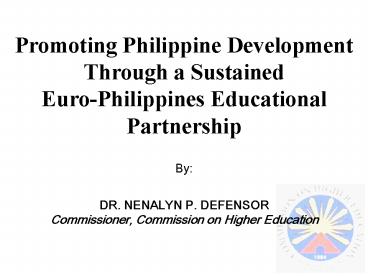Promoting Philippine Development Through a Sustained
1 / 17
Title:
Promoting Philippine Development Through a Sustained
Description:
Commissioner, Commission on Higher Education. MILLENNIUM DEVELOPMENT GOALS ... France offers the Bourse d' Excellence scholarships for Filipino exchange ... –
Number of Views:70
Avg rating:3.0/5.0
Title: Promoting Philippine Development Through a Sustained
1
Promoting Philippine Development Through a
Sustained Euro-Philippines Educational
Partnership By DR. NENALYN P.
DEFENSOR Commissioner, Commission on Higher
Education
2
- MILLENNIUM DEVELOPMENT GOALS
- eradicate extreme poverty and hunger
- achieve universal primary education
- promote gender equality and empower women
- reduce child mortality
- improve maternal health
- combat HIV, Aids, and other diseases
- ensure environmental sustainability
- develop a global partnership for
development
3
- VISION FOR HIGHER EDUCATION
- Higher education institutions (HEIs) shall be key
players in advancing new knowledge for the
improvement of academic instruction, productivity
enhancement and job creation - CHED is envisioned to be the lead catalyst in
transforming the country into a prime knowledge
center in Southeast Asia
4
3. As input to poverty reduction, higher
education shall supply, through its HRD
function, competent basic service providers such
as teachers, health and social workers to
respond to the needs of the population and
high-level technical manpower for the domestic
and international market 4. Higher Education
shall promote and support transfer of
technologies generated by HEls for improving
production 5. Higher education system further
aims to contribute to the peace
process, bureaucratic reforms and
fiscal-strengthening goals
5
- KEY CHALLENGES IN RP HIGHER EDUCATION
- To respond critically and strategically to the
human resources development challenges from both
the domestic and international arena - To be more proactive in mobilizing knowledge to
directly contribute to productivity by, for
example, re-orienting university-based research
and development towards systematic and purposive
utilization of research outputs to generate
employment and support poverty reduction and - To assist in the overall effort of the national
government to attain social, bureaucratic and
fiscal reforms through human resources
development and efficient management.
6
- PHILIPPINE-EURO ACADEMIC LINKS AND PARTNERSHIP
- Background
- Since 1997, the European Commission (EC)
delegation and Philippine senior officials have
engaged in periodic reviews of political,
economic and cooperation issues - approval in March of 2002 of the EC-Philippines
Strategy Paper for 2007-2013 and the Multi Annual
Indicative Programme - Philippine Government Initiatives
- Agreements on cultural and educational
cooperation between the governments of the
Republic of the Philippines and member states of
the European Union have been forged - Overseas Programs
7
B. European Commission Partnership The
European Commission has set up several programmes
which are availed of by Philippine colleges and
universities 1. EC-Asia Link programme
activities which is classified into three
partnership projects, capacity-building actions
and programme support activities. 2. EC has
granted scholarships to highly qualified graduate
students from developing countries through the
Erasmus Mundus scholarship programme.
8
TABLE 1 Involvement of Philippine HEIs in Asia
Link Activities 2002-2008
9
Contn
10
Contn
11
- 3. Third, the EC has collaborated with the
European Studies Consortium of the Philippines
which comprises three higher education
institutions De La Salle University, Ateneo de
Manila University and the University of the
Philippines. - C. Embassy Scholarships and Cultural Changes
- Samples are
- German Academic Exchange Service or DAAD shows
over 600 Filipinos have benefited from this
exchange for the past years - France offers the Bourse d Excellence
scholarships for Filipino exchange students as
well as the Eiffel scholarships - United Kingdom has the Chevening Scholarships
12
- The British Council and Commission on Higher
Education Partnership - In a project funded by the Asian Development Bank
and with expertise provided by the British
Council, CHED undertook a project entitled
Organizational Development of the Commission on
Higher Education - CHED was empowered by Republic Act No. 7722 among
others, to monitor and evaluate performance of
programs and institutions of higher learning and
with the help of British Council, developed the
Institutional Monitoring and Evaluation for
Quality Assurance Framework
13
- CHALLENGES IN EURO-RP COOPERATION
- 1. Under the internationalization advocacy
plan of - CHED as contained in the CMOs the
following - conditions need to be threshed out
- need for a supportive mission from the
- participating higher education institution
- need for funding support to increase the
speed at - which higher education institutions can
- internationalize
- appropriate structure to handle
- internationalization initiatives
14
Table 2 Proportion of European to Total Number
of Foreign Students in RP From AY 1997-1998 to
2006-2007
15
2. A review of student and faculty exchange
is necessary to determine in what fields
of discipline were they mobilized and
whether these were relevant to the
development goals of the country.
3. Philippine universities and colleges
still have to overcome obstacles to
reach a stage in which student mobility
programs are not special activities but
are integral components of their
programs and processes. Associations similar to
the university mobility for Asia and the
Pacific (UMAP) should be encouraged.
16
4. Procedure and processes in the mutual
recognition of higher education degrees and
diplomas have to be further worked out. These
should include credit transfer
schemes. 5. There is a need to fast track
the RP-European Community
Partnership Cooperation agreement which
embraces a wide range of educational and
cultural exchanges.
17
THANK YOU!































